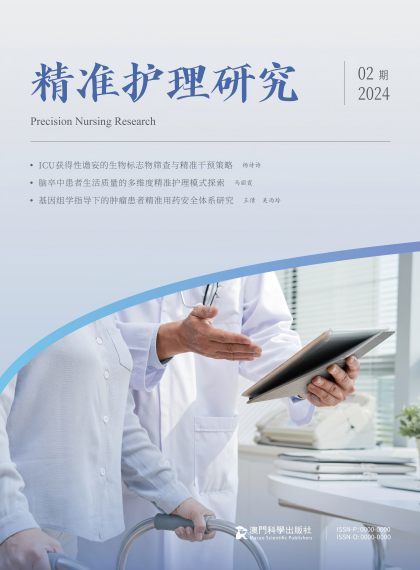摘 要:
随着多组学技术的发展,人类对疾病的发生机制、诊断及治疗精准度有了显著提升。然而,这些数据在临床护理决策中的应用仍处于探索阶段。本研究旨在构建并验证一种基于多组学数据的精准护理决策模型,以提升护理质量和患者健康结局。首先,研究收集了基因组学、转录组学、代谢组学等多组学数据,并结合患者个性化健康数据进行了整合分析。随后,通过机器学习算法筛选重要护理相关变量,在此基础上建立了精准护理决策模型。模型通过真实病例数据进行了验证,结果表明,该模型能够显著提高护理干预的有效性和针对性,尤其在慢性病患者的个性化护理方案制定方面表现优异。此外,模型还展示了较高的稳定性和可重复性,同时降低了护理资源的浪费风险。研究表明,该决策模型可为精准护理模式的推广和实践提供数据支持与技术路径,为临床护理体系的智能化转型提供了重要参考。未来的应用可以扩大模型适用范围,并进一步结合临床实践反馈不断优化,以满足多样化的护理需求。
关键词:多组学数据;精准护理;决策模型;机器学习;个性化健康数据
Abstract:
With the development of multi-omics technologies, there has been a significant improvement in our understanding of the mechanisms of disease occurrence, diagnosis, and treatment precision. However, the application of these data in clinical nursing decision-making is still in the exploratory stage. This study aims to construct and validate a precision nursing decision-making model based on multi-omics data to enhance nursing quality and patient health outcomes. First, the research collected multi-omics data, including genomics, transcriptomics, and metabolomics, and conducted integrated analyses in conjunction with personalized health data from patients. Subsequently, important nursing-related variables were identified through machine learning algorithms, and a precision nursing decision-making model was established on this basis. The model was validated using real case data, and the results indicated that it could significantly improve the effectiveness and specificity of nursing interventions, especially in formulating personalized care plans for patients with chronic diseases. Moreover, the model demonstrated high stability and reproducibility while reducing the risk of waste in nursing resources. The study suggests that this decision-making model can provide data support and technical pathways for the promotion and practice of precision nursing models, offering an important reference for the intelligent transformation of clinical nursing systems. Future applications may expand the model's scope and continue to optimize it based on clinical practice feedback to meet diverse nursing needs.
Keywords: Multi-omics data; Precision nursing; Decision-making model; Machine learning; Personalized health data
--
